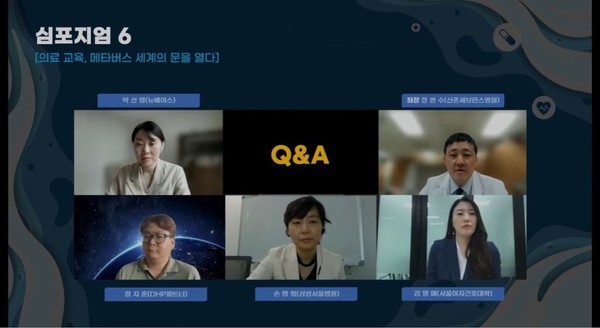Metaverse, a convergence of virtual and physical space, could help overcome limitations of medical training in the Covid-19 pandemic era, health experts said.
To utilize metaverse as an alternative to conventional technology, people need to expand the experience of metaverse for users to recognize the need for medical education, they said.
The word metaverse comprises the prefix “meta,” meaning virtual, and “universe,” telling the real world. It is a more advanced concept than the existing virtual reality (VR). The core technology of the metaverse is extended reality (XR), which encompasses VR, augmented reality (AR), and mixed reality (MR).
Health experts engaged in active discussions over metaverse’s role in medical education, merits of the metaverse, and its limitations in the medical field at a conference, hosted by the Korean Society of Medical Informatics on Wednesday.
Jeong Ji-hoon, partner and co-founder of Digital Healthcare Partners (DHP), said “interaction” was the advantage of the metaverse and should be used more broadly.

“The biggest advantage of the metaverse is that it can generate interaction among participants, unlike the existing one-way education,” Jeong said.
“In medical education, it will be used for simulation training rather than for simple knowledge delivery.”
Metaverse-using medical training will be more effective in areas that require advanced hand skills and interactions, which will raise the need for additional technology, he went on to say.
In surgery, for example, not only the metaverse environment but the use of devices with good hand skills is important. Thus, corresponding hardware or tracking technology will be needed, he said.
“Metaverse technology should become diverse on a case-by-case basis,” he added.
As metaverse programs are still experimental, their validation (evaluating if a certain system produces results meeting the preset criteria consistently and documenting it) will not be entirely possible, Jeong noted.
Thus, the nation should expand the introduction of the metaverse rather than tightening regulations, he claimed.
Professor Son Meong-hi of the Department of Pediatrics at Samsung Medical Center said it was difficult to validate the effect of medical education, regardless of the use of metaverse. “It is more important to check the feasibility of metaverse rather than its effect. Then, if user satisfaction rises, the effect will follow naturally, and it can be confirmed retrospectively,” she said.
“Even if metaverse technology is still incomplete, there should be no restrictions in applying new technologies to medical education.”
The concept of the metaverse is still new to many healthcare professionals in Korean hospitals, Son said. However, to prepare medical education using metaverse in the future, they should know the merits of medical education in the metaverse environment, compared to traditional education or simulation-based education, and predict what kind of education will become available.
She hoped that more people could learn that metaverse makes it easier to develop educational content because the contents are accumulated in the metaverse environment.
New Base CEO Park Sun-young, who developed the medical simulation game Vulabo, also highlighted the need for metaverse introduction in medical training.
Park shared her experience of participating in various medical training sessions trying out Vulabo.
“Many professors focused on whether Vulabo service complied with the medical guidelines and verified learning design and evaluation tools thoroughly, hesitating a lot whether to introduce it,” she said.
As a content creator and technology developer, Park said the company was using verified evaluation tools and guidelines to develop a service.
To apply new technology to clinical care and measure effectiveness, it is important to raise the learning effect and satisfaction through feedback from the software aspect, rather than the hardware aspect, she said.
Kim Myung-ae, a professor at Seoul Women’s University College of Nursing, said the introduction of metaverse was crucial in nursing education because there was a gap between patient care and medical education.
She said the Covid-19 pandemic accelerated the need for metaverse in nursing education.
“When I saw a presentation showing nursing training through virtual reality at a conference, I felt sorry that technology needs to be advanced more to meet the needs in the clinical scene,” she said.
Kim suggested prioritizing what is most needed in introducing metaverse could be much more effective for validation.
The purpose of using metaverse or simulation centers in nursing school is to narrow the gap between nursing education and patient care, she went on to say.
Instructors should develop content well so that on-site nursing skills can be configured in virtual programs, she said.
“Nursing universities have been facing a challenge because instructors had to teach students with their careers discontinued,” Kim said. “A program that incorporates clinical field experience should be made so that learners can feel that ‘there was no difference in clinical care after practicing this in the metaverse environment.’”

